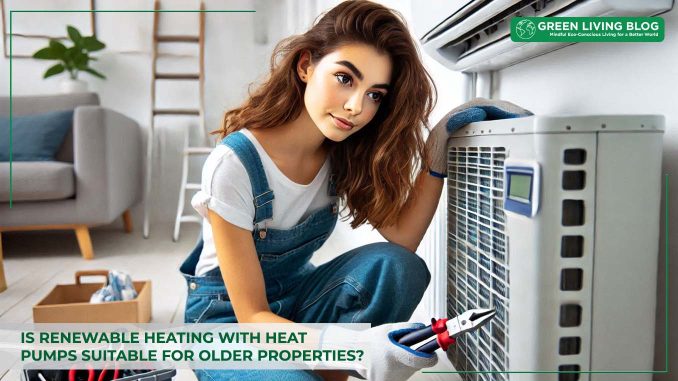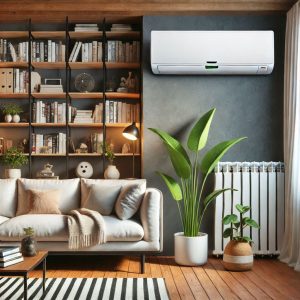
As the UK pushes towards reducing carbon emissions and embracing renewable energy, homeowners face a common question: is renewable heating, such as heat pumps, a viable option for older properties?
Traditional homes, often characterised by solid walls, limited insulation, and unique architectural features, present unique challenges. However, with the right approach, even older properties can benefit from renewable heating solutions.
What Are Heat Pumps?
Heat pumps are renewable heating systems that extract heat from the air or ground and transfer it into your home. There are two main types:
- Air Source Heat Pumps (ASHP): Extract heat from the outside air.
- Ground Source Heat Pumps (GSHP): Use heat stored in the ground.
Both systems are incredibly efficient, often delivering 3-4 kWh of heat for every 1 kWh of electricity used.
Challenges of Installing Heat Pumps in Older Properties

Older properties may face specific hurdles when transitioning to heat pumps:
1. Insulation Issues
Older properties often lack modern insulation, resulting in heat loss through walls, roofs, and windows. Heat pumps work most efficiently in well-insulated homes where the generated heat can be retained.
Solution: Insulation upgrades are essential. Installing loft insulation, cavity wall insulation (if applicable), or internal wall insulation can help minimise heat loss.
2. Radiator Size
Heat pumps deliver heat at lower temperatures compared to traditional boilers. Standard radiators in older homes might not provide sufficient warmth.
For homeowners looking to optimize their heating system, it’s worth researching the different types of radiators that are compatible with heat pumps. Many resources, including those found when searching for radiators online, can provide valuable information on the pros and cons of various radiator models, as well as tips for selecting the right size and type for a specific space.
Solution: Consider upgrading to larger radiators or underfloor heating systems to distribute heat more effectively.
3. Aesthetic Concerns
Older properties often have historic or architectural significance. Adding external units or making significant modifications might be unappealing or restricted.
Solution: Opt for discrete installation methods and consult local authorities if the property is listed or in a conservation area.
4. Electricity Requirements
Heat pumps require a reliable electricity supply, which may be a concern for properties with outdated electrical systems.
Solution: Upgrading the property’s electrical system may be necessary and is often worth the investment.
Benefits of Renewable Heating for Older Properties
Despite the challenges, renewable heating systems offer significant advantages:
1. Energy Efficiency
Heat pumps are incredibly efficient, reducing energy bills over time—especially for homes currently using oil or electric heating.
2. Lower Carbon Emissions
By transitioning to renewable heating, older properties can significantly reduce their carbon footprint, aligning with the UK’s net-zero goals.
3. Grants and Incentives
Schemes like the Boiler Upgrade Scheme (BUS) and potential local grants help offset installation costs, making renewable heating more affordable.
4. Increased Property Value
Homes with renewable heating systems are increasingly attractive to environmentally conscious buyers.
Is a Heat Pump Right for Your Older Property?

To determine if a heat pump is suitable, consider:
- Energy Efficiency Assessment: Conduct an energy performance check to identify areas of improvement.
- Professional Consultation: Engage a qualified installer to evaluate your property’s heating requirements and insulation levels.
- Budget Considerations: While upfront costs can be high, long-term savings and available incentives may justify the investment.
Alternatives for Older Properties
If heat pumps aren’t immediately feasible, consider other renewable heating options:
- Biomass Boilers: Ideal for properties with space for fuel storage.
- Solar Thermal Systems: Supplement water heating requirements with solar energy.
Final Thoughts
Renewable heating, like heat pumps, is increasingly viable for older properties when combined with thoughtful preparation and upgrades.
While the transition may require an initial investment, the long-term benefits—both financial and environmental—are substantial. By embracing renewable heating systems, older properties can retain their charm while stepping into a sustainable future.
If you’re considering heat pumps for your older home, consult with a heating specialist to explore your options and create a plan tailored to your property’s unique needs.
![]()
Author Profile

- Eco Warrior by day, Eco Blogger by night trying to get the eco balance right.
Latest entries
 Green Expert GuidesApril 25, 2025Wooden Glasses: A Sustainable Evolution in the Eyewear Industry
Green Expert GuidesApril 25, 2025Wooden Glasses: A Sustainable Evolution in the Eyewear Industry Green Home GuidesApril 17, 2025How Heat Pumps Help Cut Household Carbon Emissions
Green Home GuidesApril 17, 2025How Heat Pumps Help Cut Household Carbon Emissions EnvironmentApril 17, 20256 Benefits of Wall Cladding for Eco-Friendly Renovations
EnvironmentApril 17, 20256 Benefits of Wall Cladding for Eco-Friendly Renovations EnvironmentMarch 31, 20255 Sustainable Materials for Building Your Dream Eco-Friendly Pergola
EnvironmentMarch 31, 20255 Sustainable Materials for Building Your Dream Eco-Friendly Pergola





Leave a Reply
You must be logged in to post a comment.